Departure: An ongoing community art project
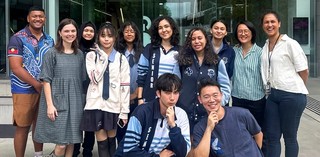
Students from Mabel Park High School gather with their workshop facilitators outside GOMA, March 2025 / Photograph: Chang Po Ching / View full image
Christine Ko and Louis Lim reflect on their participation in the eleventh Asia Pacific Triennial. This is part three of a series that captures reflections from participants involved in ‘The 11th Asia Pacific Triennial of Contemporary Art’ Community Partner Program.
We are Christine and Louis, visual artists based in Meanjin/Brisbane. We held a workshop with seven students of Asian and Pacific heritage from Mabel Park State High School: Agatha, Ana Pia, Belle, Shabnam, Tiare, Trang and Wasin. Their school chaperone Chang, who is of Samoan and Chinese heritage, joined in as well. The workshop we developed was based on a desire to find out what generational shifts have occurred, if any, in the experiences of migrant youths growing up in Australia, as well as in their perceptions of cultural identity and Australian society. This curiosity came about while undertaking our collaborative project, Departure, where we interviewed a few children of migrant backgrounds and noticed the differences between their school experiences and our own.
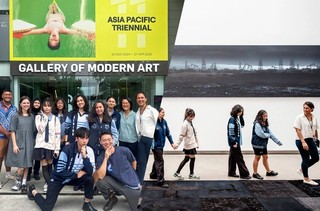
(l-r) Students from Mabel Park High School gather with their workshop facilitators outside GOMA, March 2025, Photograph: Chang Po Ching, Mabel Park High School / Students view works by Brett Graham installed at GOMA for the eleventh Asia Pacific Triennial, March 2025 / Photograph: J Ruckli © QAGOMA / View full image
Departure is an ongoing community art project that we have been facilitating over the past couple of years, focused on telling the individual stories of Australians with migrant backgrounds. We were drawn to develop this project due to our own experiences as migrants to Australia and having witnessed through art practice how empowering the act of storytelling can be. Departure involves interviewing participants of varying ages and cultural backgrounds and helping them to design and make kites using significant family photos and objects relating to their individual migrant experiences. Each interview is edited and formatted to read like a letter and is displayed with the hanging kites to form a large communal installation where visitors can find out each participant’s story by reading the letters and viewing the kites.
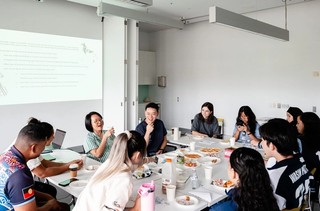
Christine and Louis facilitate the workshop with students from Mabel Park High School, GOMA, March 2025 / Photograph: J Ruckli © QAGOMA / View full image
With our interviewing process, we were conscious of steering away from a traditional format where the interviewer asks questions of the interviewee. We wanted to create a space where we could connect personally with each participant, based on the conversational sharing of experiences. We found that this mutual sharing helped participants to feel comfortable telling their own stories and created a sense of connection to a collective experience.
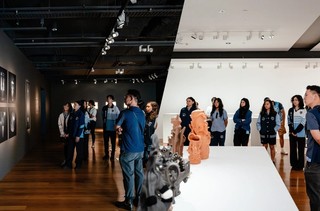
Workshop students view works by Alexander Ugay and Mai Nguyễn-Long installed at GOMA for the eleventh Asia Pacific Triennial, March 2025 / Photographs: J Ruckli © QAGOMA / View full image
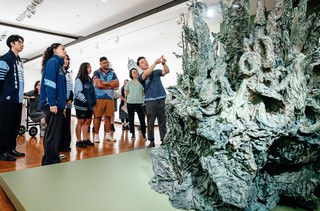
Workshop students view works by Zhang Xu Zhan installed at GOMA for the eleventh Asia Pacific Triennial, March 2025 / Photograph: J Ruckli © QAGOMA / View full image
We developed a CPP workshop with the school students based on this approach.The day started with a brief introduction to our individual art practices and an overview of the Departure project and its relationship to the CCP workshop. We then took the students on a tour of artworks in the Asia Pacific Triennial, highlighting works by artists that resonated with our theme of migration and identity. The artists we focused on were Ishu Han, Kawita Vatanajyankur (illustrated), Alexander Ugay, Mai Nguyễn-Long (illustrated) and Zhang Xu Zhan (illustrated).
Kawita Vatanajyankur The Machine Ghost in the Human Shell 2024

Kawita Vatanajyankur, Thailand b.1987 / Pat Pataranutaporn, United States b.1995 / The Machine Ghost in the Human Shell (from the ‘Cyber Labour’ series) 2024 / Performative hologram projections with AI / Commissioned for ‘The 11th Asia Pacific Triennial of Contemporary Art’, 2024’ / © Kawita Vatanyankur / Courtesy: The artist and Nova Contemporary / View full image
Watch | Time-lapse of the Vomit Girl Project installation
Zhang Xu Zhan Compound eyes of tropical 2020–22/2024
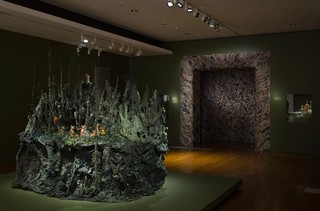
Zhang Xu Zhan, Taiwan b.1988 / Compound eyes of tropical 2020–22/2024, installation view ‘The 11th Asia Pacific Triennial of Contemporary Art’ 2024 / Single-channel 4K video installation: colour, sound, 16 minutes, ed. 6/6; wire, newspaper, glazed paper, paste, plastic beads, accessories / 5 puppets: 5 bases / Lakeview Square – Gamelan Band 2021–22 / Wire, newspaper, glazed paper, paste, plastic beads, accessories / Purchased 2024. QAGOMA Foundation / Collection: Queensland Art Gallery | Gallery of Modern Art / © Zhang Xu Zhan / Photograph: C Callistemon © QAGOMA / View full image
After the gallery tour, we held a morning tea where we brought in various food items from our childhoods to share with the students. Food plays such a significant role within migrant communities — tied to traditions and memories — so we wanted to use this meal as a way to engage with the students, to stimulate conversations around growing up in Australia with differing cultural backgrounds. During this time, we also asked the students to reflect on the artworks we viewed during the gallery tour; we got the sense that some students revealed personal details about their lives because they felt a direct connection with certain artworks. By sharing our food and our memories, it seemed we were able to create a space where students felt comfortable to openly share their thoughts and experiences with the group.
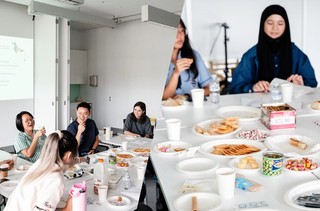
During their workshop, students share a meal of foods from Christine and Louis’s childhoods, GOMA, March 2025 / (l-r) Photographs: Louis Lim, J Ruckli © QAGOMA / View full image
After the morning tea and lunch break, we got the students to partake in a letter-writing task. Following on from the conversations we’d had together earlier, we asked them to write a letter to a foreign penpal using the following prompts to help them think about experiences they could share:
- How was it like growing up as a person of colour in Australia?
- Is English your second language? Did it help or hinder navigating life in Australia?
- What type of food do you bring for school lunches? Are your friends envious of your lunchbox or do they pick on you about what you eat? Or do they not really care?
- Have you ever had disagreements with your parents that stemmed from differences between your cultural identities and values?
- Was there a time when you felt ashamed about your cultural background?
- Was there a time when you felt proud of your cultural background?
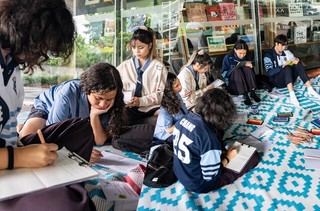
Students from Mabel Park State High write letters as part of their workshop at QAGOMA, March 2025 / Photographs: Louis Lim / View full image
We weren’t sure how engaged the students would be with the letter-writing task. To be honest, we weren’t sure how successful the whole workshop was going to be. We were concerned that, being teenagers, they may be unwilling to articulate their thoughts and feelings if it was something they weren’t used to doing. (We had found this to be the case with some of the adult participants in Departure.) However, we were so impressed with the students’ letters and their willingness to share their personal experiences and vulnerabilities. It seemed like our use of food and our conversational approach worked to help us connect with the students — and to help them feel comfortable to share aspects of themselves. One student even asked us for advice about their future, which was unexpected but made us feel honoured that they valued our opinions!
Through our collaboration with QAGOMA in the Community Partner Program, we have witnessed firsthand how participants can benefit from learning about art from their cultural backgrounds — in this case, the Asia Pacific region — and how valuable it is for people to see their individual stories reflected in the artworks. We also learned a lot about cultural communities outside of our own, and we could see that although some progress has been made towards cultural acceptance in this country, some things have not changed much at all. Many young people are still struggling with the same issues around their cultural identity that we did at their age. We hope the Community Partner Program can continue fostering these connections between communities. Together, we can help to empower future generations of young Australians through art and the articulation of personal narratives.
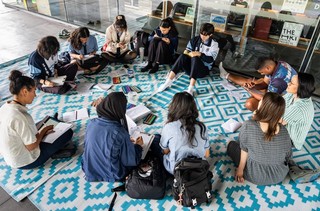
Students from Mabel Park State High write letters as part of their workshop at QAGOMA, March 2025 / Photograph: Louis Lim / View full image
Christine Ko and Louis Lim, 'The 11th Asia Pacific Triennial of Contemporary Art' Community Partners
Aniway Aquilizan; Christine Ko and Louis Lim; Mohammed Azhari and Sara Shera, Australian International Islamic Colleges; Nina Taukiri, Queensland Māori Society; and Pasifika Women’s Alliance have been invited to work with QAGOMA to design and deliver a project with a specific segment of our Asian or Pacific communities. The aim is to investigate, co-design and actively foster meaningful connections and interactions between Triennial artists, audiences and local Asian and Pacific communities through a series of partner-led programs.
Asia Pacific Triennial
30 November 2024 – 27 April 2025
Queensland Art Gallery and Gallery of Modern Art (QAGOMA)
Brisbane, Australia
Free entry

